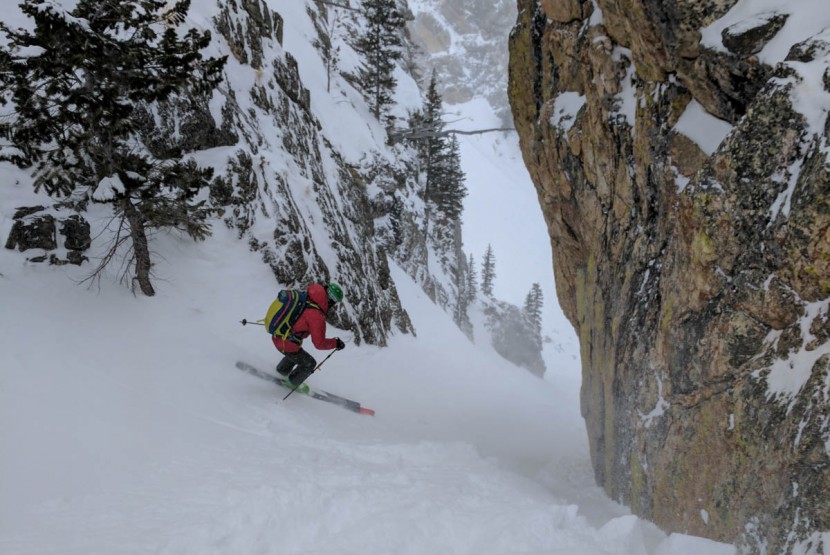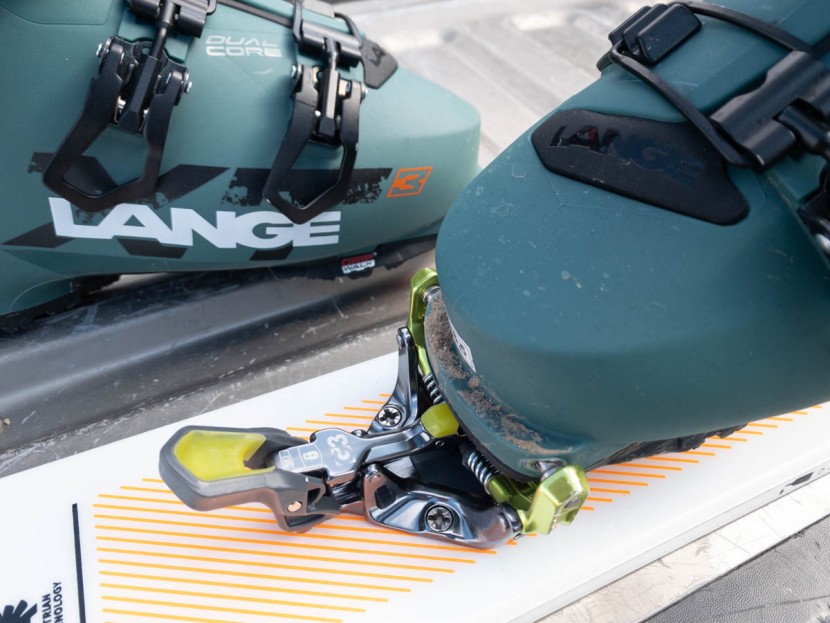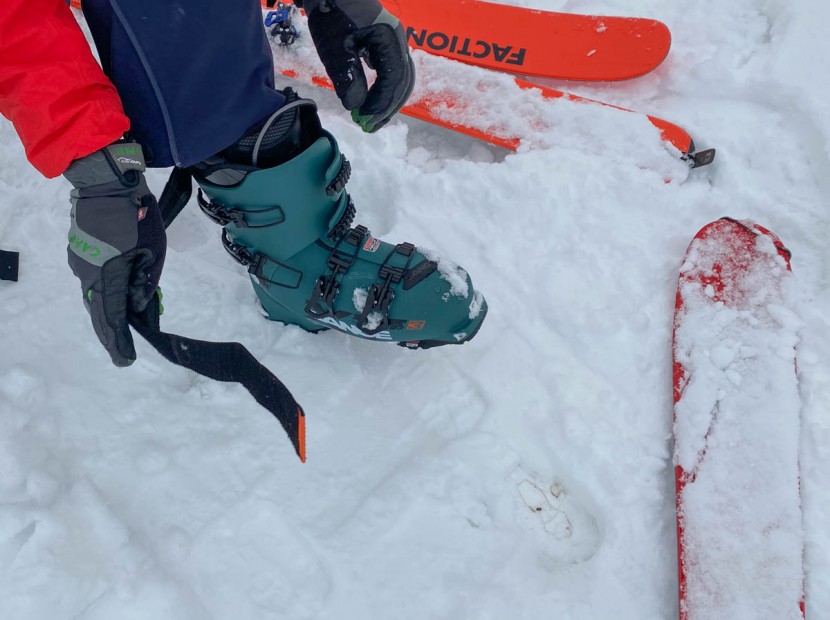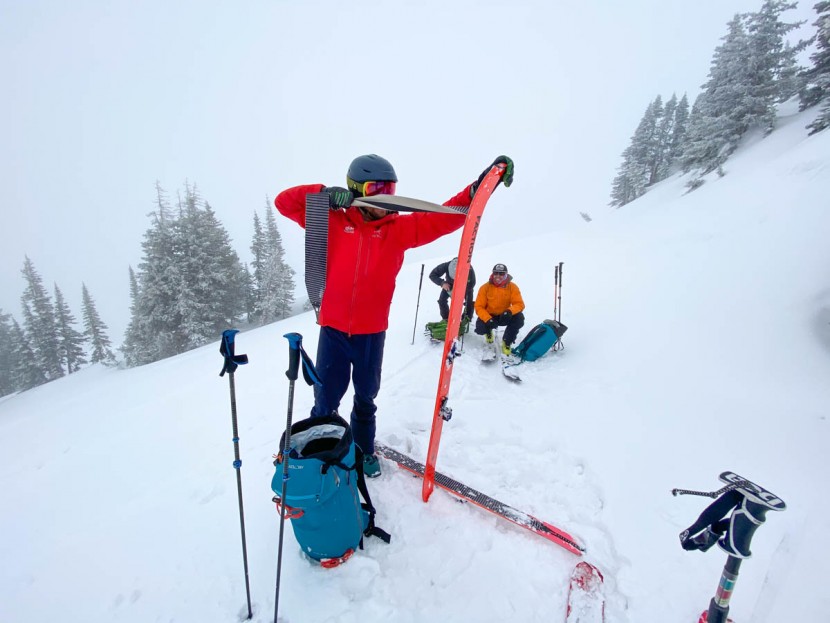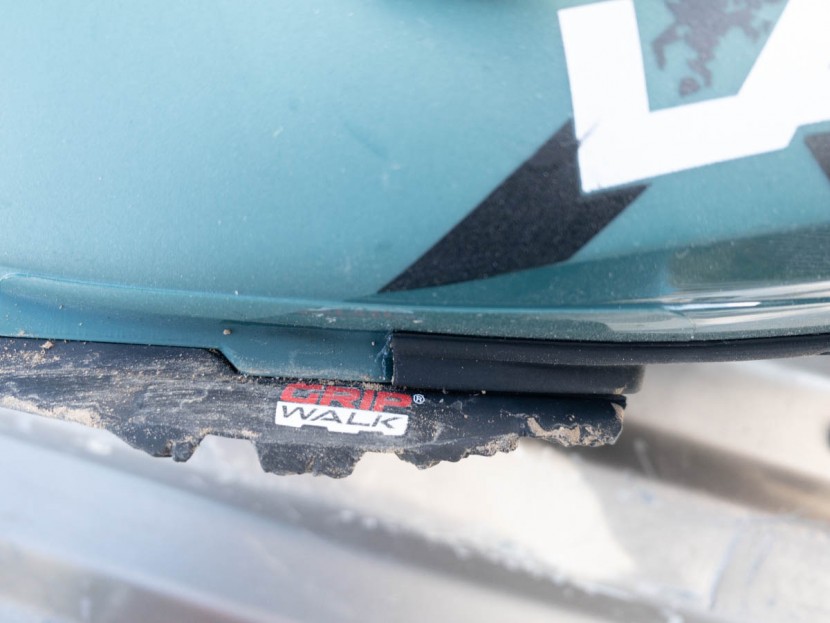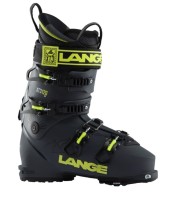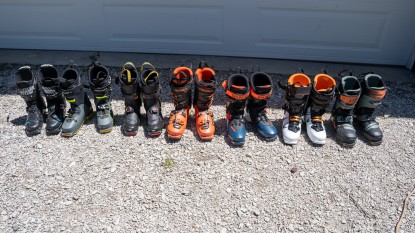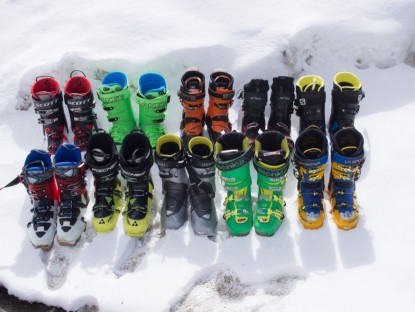
Our Verdict
Our Analysis and Test Results
Lange is a ski boot company. They make nothing else. For this, we applaud them. In a world of “vertical integration”, where every company seems bent on taking over the world, it is refreshing when one outfit focuses. For years and years, even as the AT ski business boomed, it seemed that Lange would stay focused on alpine only boots. We, for one, are thankful that Lange has bucked this inertia and decided to enter the AT ski boot market. Their XT3 brings alpine performance with just a touch of touring functionality to make it a specialized backcountry downhill ski tool for the modern market. This is an alpine ski boot that tours. Nothing else.
Downhill Performance
The Lange XT3 goes downhill very, very well. You choose these for downhill performance. Their downhill performance is virtually indistinguishable from typical recreational resort boots. The materials, geometry, construction, and accessories are all tuned for downhill performance first.
The “touring dork” faction of our test team is blown away by the Lange XT3. To show this misanthropic, reclusive team how rad optimal downhill performance can be has been a sweet treat. It takes them an adjustment period (yes, going from flimsy boots to stiff boots is nearly as tricky as the opposite journey), but it changes their view without fail. The Lange is too heavy and confining for extended human-powered use, but it opens the eyes of even the most jaded practitioners.
Uphill Performance
We are careful with our words. This is an alpine ski boot that also tours. It isn't a “backcountry ski boot” in the modern sense of the phrase. The “walk mode” has limited range and a great deal of friction. The fore-aft walk mode flexion range of the XT3 is the lowest in our entire test. We measured it at 34 degrees, total. We find that limiting, even in boots that offer low friction within the range. Ankles and bodies like 40 degrees or more of cuff range.
Further, efficiency comes from range and friction within that range. The associated friction of the tight Lange pivot rivets and closely engineered ski/walk mode switch makes for a tool that, even in walk mode, feels like an alpine boot. These are ski boots for short tours. You will suffer, as compared to anything else in our review and most of the backcountry boot market, on the uphill in these Lange boots.
Weight
On our calibrated scale, we measured the size 26.5 tester pair of the Lange XT3 to weigh 7 pounds 11 ounces. That's 1750 grams per boot. Of that, 1398 grams is in the shell, and 310 grams is in the liner. The liner is heavier than average but not the heaviest available in a touring boot. The shell is heavier than anything else in our current test, and nearly twice the weight of one of our highest award winners. It is definitely more than twice the weight of uber light options on the market.
Beware catalog copy. Boots in this category are touted as being “lightweight”. As compared to resort boots, they are. A pair of Lange XT3 might weigh 80% of what resort boots weigh. They might weigh 50% of the absolute heaviest boots, provided those heavy boots are equipped with rigid, vacuum-style custom liners. However, the range of touring boot weights is significant. As we noted above, the Lange XT3 is more than 200% the weight of the lightest competitors. The weight of this Lange is much closer to average resort boots than it is to average touring boots.
Comfort and Fit
The XT3 is one of the rare boots in our test that worked for most testers straight out of the box. Only a few share this honor. All the others required some sort of work to be usable by the bulk of our test team. Now, our test team is pretty resilient. They swap ski boots from one day to the next for long days of ski mountaineering and backcountry skiing. You may very well need to customize any of the boots we didn't.
Further enhancing the value, fit and appeal of this boot, Lange sells it in a “low volume” version. This LV version, presumably (we did not test it), offers the same performance attributes with less space inside for a given shell length. This is amazing and will further sell the boot to those tougher to fit. We have to attribute the fit options to Lange's commitment to ski boots.
Warmth
You lug all that material up the mountain. The bulk and mass of the Lange XT3 is first credited with mind-blowing downhill performance. The next and hidden advantage of the thick liners and shells is in insulating value. More material around your foot makes your foot warmer. After fit, warmth is mostly influenced by the shell and liner thickness. These Lange boots are thick, first for downhill performance. The upshot is that this makes them warmer too. As compared to ultralight boots, the XT3 is more insulating. It is similar to other heavy and thick boots in our test.
Ease of Use
To optimize downhill performance, the XT3 is built with “overlap construction”. This means that the entire boot is two pieces. To get in and out of the boot, one must flex overlapping flaps out of the way on both cuff and lower boot. “Three piece” or “tongue constructed” boots have a front tongue that folds out of the way for entry. In short, it is easier to get in and out of tongue boots than overlap boots. In some instances, this difference is unimportant. If you can put your boots on in a warm lodge or hut, it doesn't matter very much. If you are on the tailgate of your car in a cold and windy parking lot or, even worse, in a tent on an expedition, overlap boots can be a battle not worth fighting. For this reason alone, and we know it may seem silly, but trust us, we don't recommend the XT3 for overnight ski touring camping.
Otherwise, the four standard buckles, velcro power strap, and tightly engineered walk-mode are familiar and reliable. The external walk mode switches on other boots are easier to operate and less likely to ice up than the XT3, but not by much. One major attribute of the XT3 is its sole. Regarding binding compatibility, this boot is more versatile than most others in our test. Like all the boots we tested, and this is how we tested all of them, the Lange can be used in modern “tech” style touring bindings. These are the best bindings for all sorts of backcountry skiing. Also, the sole of the Lange is built to be compatible (and safe for use) with so-called GripWalk alpine resort bindings. For use in-bounds, GripWalk bindings are better than touring bindings. Then, the XT3 boots are more versatile for those that want boots for inbounds and a little bit of out.
Should You Buy the Lange XT3 120?
For your normal, skin-accessed, largely straight up and straight down ski touring, the compromises of uphill efficiency of the Lange XT3 can be reasonably overcome. Ski performance aside, that's high praise coming from us. For their performance, the XT3 isn't very expensive. In fact, touring ski boot prices are consolidating nearly across the board. Further enhancing the value of the XT3 is its durability. These boots will last a long, long time. If recent history is any indication, this level of downhill-uphill balance won't be dramatically eclipsed for years and years.
What Other Backcountry Ski Boots Should You Consider?
For flat approaches, huge days, and any sort of non-skinning (cramponing, walking, scrambling), the limited cuff mobility of the Lange XT3 will indeed be noticed. In those situations — onces which most backcountry skiers will find themselves from time to time — the XT3 boots will be onerous. That is the reason we recommend lighter and more flexible boots like the Tecnica Zero G Tour Pro for all-around use. And if you're all about the up, an even more flexible boot like the Scarpa F1 LT better fits the bill.
| Awards | Best Hybrid Boot |
|---|---|
| Price | $750 List Check Evo (on sale!) |
Overall Score  |
|
| Star Rating | |
| Bottom Line | These are lightly modified resort boots, built to optimize the downhill and be minimally functional on the way up |
| Pros | Excellent downhill performance, durable, warm, reliable, familiar |
| Cons | Very limited uphill and foot-travel performance, heavy |
| Rating Categories | Lange XT3 120 |
| Downhill Performance (35%) | |
| Uphill Performance (20%) | |
| Weight (20%) | |
| Comfort and Fit (10%) | |
| Warmth (10%) | |
| Ease of Use (5%) | |
| Specifications | Lange XT3 120 |
| Weight per Pair (Size 26.5) | 7 lbs 11 oz |
| Binding Compatibility? | Tech, DIN AT, Grip Walk |
| Measured Range of Motion (degrees) | 34° |
| Manufacturer Stated Last Width | 100 mm |
| Weight of One Complete Boot, No Insole | 1750 g |
| Weight of One Boot Shell | 1398 g |
| Weight of One Stock Liner, No Footbed | 352 g |
| Stated Flex Index | 120 |
| Liner Design | Wrap |
| Shell Material | Polyurethane |



